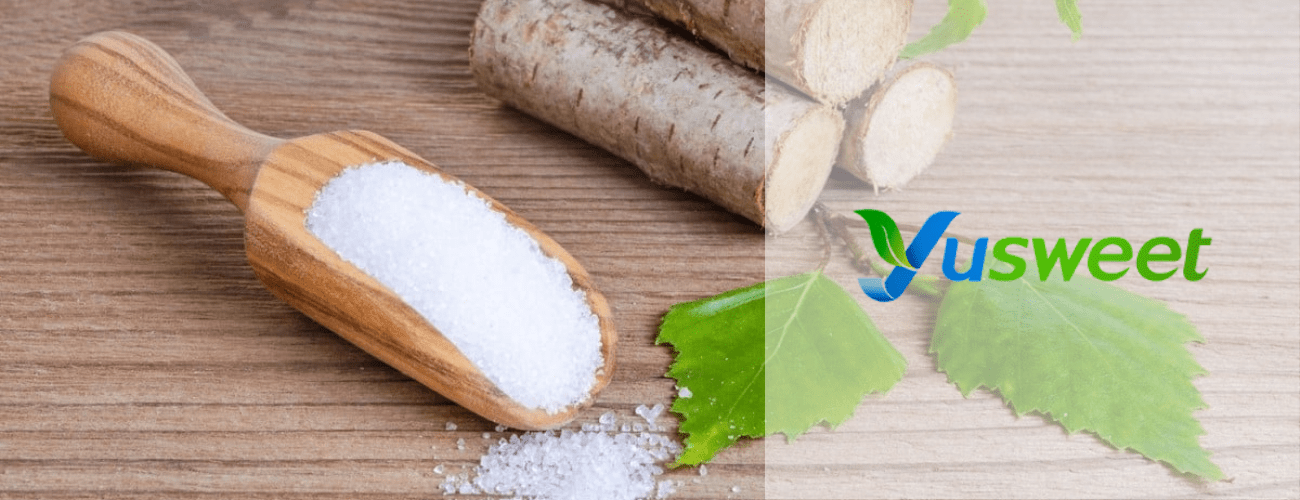Yusweet
Yusweet, established in 1996, started to manufacture xylitol in 2003 with annual capacity now about 20,000MT and for D-xylose is now at 10,000MT. The company adheres to European and American quality management system, focuses on polyol industry for nearly 30 years, offering various products and services to meet customer’s desire for natural, nutritional and healthy sweetness.
After many years of development in the industry, Yusweet has become a well-known polyol provider with product portfolio covering Xylose, Xylitol, Erythritol, Maltitol , L-arabinose and compounded sugar. With continuous improvement in sustainability and efficiency, Yusweet has built long-term partnerships with many famous customers home and abroad in food, health care, pharmaceutical, daily chemical and pet food industries. [->]
Yusweet is certified with : Halal | Kosher | ISO 9001 | ISO 14001 | FSSC 22000 | GMP
Products offered are : Xylitol | Maltitol | Erythritol
Products
Xylitol
Xylitol is categorized as a sugar alcohol, Even though sugar alcohols are technically carbohydrates, most of them do not raise blood sugar levels and thereby don’t count as net carbs, making them popular sweeteners in low-carb products. Chemically, sugar alcohols combine traits of sugar molecules and alcohol molecules. Their structure allows them to stimulate the taste receptors for sweetness on your tongue. Xylitol is found in small amounts in many fruits and vegetables and is therefore considered natural. Humans even produce small quantities of it via normal metabolism.
Xylitol Applications
| Industry | Application |
|---|---|
| Pharma | throat lozenges, nasal sprays, and chewable tablets, tablets, syrups, coatings, Sugar-free medications, oral care products |
| Nutra | Nutritional supplements, protein bars, low-sugar health products, energy drinks, sports drinks |
| Food | chewing gum, candy, chocolate, Coffee sugar, beverage, desserts, ice cream, children foods, traditional foods. |
Benefits of Xylitol
- Anti-cariogenic
- Low calorie
- Improve liver function
- Improve functions of gastric and intestinal system
- Extending shelf-life of foods
- No "Maillard" browning reaction
Specifications of Xylitol
| Specifications | Value |
|---|---|
| Chemical formula | C5H12O5 |
| pH value | 5.0-7.0 |
| Assay | 98.5-101.0% |
| Reducing sugars | 0.01 against 0.2% limit |
Top FAQs on Xylitol
Erythritol
Erythritol is an organic compound, sugar alcohol, and artificial sweetener. It is used as a food additive and sugar substitute. It can also be found in a variety of fruits, vegetables, and fermented foods and beverages. Erythritol is unique from other sugar alcohols because it contains zero calories. It is almost as sweet as sugar and has practically no calories. Erythritol is designed to replace sugar and calories to create “diet-friendly” results.
Erythritol Applications
| Industry | Application |
|---|---|
| Pharma | coated tablets, effervescent tablets, compressed tablets and Medicine lozenge |
| Nutra | protein powders, meal replacement shakes, vitamin supplements, chewable tablets or gummies |
| Food | low-calorie soft drinks, flavored waters and milks, sports drinks, smoothies, iced teas, frozen beverages and soy-based beverages, custard, Ice cream, hard candies, gummies, fondant, Chewing gum, chocolate, frozen dairy products, yogurt, sauces, jellies |
Benefits of Erythritol
- Can be used as a sugar substitute in baking and cooking
- Does not raise blood sugar levels
- Has a low glycemic index
- May improve dental health
- Has a mild laxative effect
Specifications of Erythritol
| Specifications | Value |
|---|---|
| Assay | 99.5-100.5% |
| Ribitol and Glycerol | Max.0.1% |
| Reducing sugars | Max. 0.3% |
| Loss on drying/water | Max. 0.2% |
Top FAQs on Erythritol
Maltitol
Maltitol is a sugar alcohol, also known as a polyol used as a sugar substitute in food products. It has 75–90% of the sweetness of sucrose (table sugar) and nearly identical properties, except for browning. It is used to replace table sugar because it is half as calorific, does not promote tooth decay, and has a somewhat lesser effect on blood glucose. In chemical terms, maltitol is known as 4-O-α-glucopyranosyl-D-sorbitol. Maltitol is a disaccharide produced by hydrogenation of maltose obtained from starch. Maltitol syrup, a hydrogenated starch hydrolysate, is produced by hydrogenating corn syrup, a mixture of carbohydrates produced from the hydrolysis of starch. Maltitol is utilized in sugar-free and reduced-sugar items. It is tooth-friendly, does not contribute to tooth decay, and offers a texture resembling sugar. As a versatile sweetener, maltitol is a popular choice for individuals seeking lower-calorie alternatives in their diet.
Maltitol Applications
| Industry | Application |
|---|---|
| Pharma | Sugar-free medications, chewable tablets, liquid pharmaceuticals, Oral dosage forms |
| Nutra | Nutritional supplements, protein bars, low-sugar health products |
| Food | Sugar-free candies, chocolates, baked goods (cakes, cookies), confectionery, jams, jellies, dairy products, ice cream, chewing gum, desserts, beverages (soft drinks, fruit drinks) |
Benefits of Maltitol
- Low-calorie sugar alternative
- Suitable for weight management
- Helps control blood sugar
- Improved texture & mouthfeel
- Less impact on dental health
Specifications of Maltitol
| Specifications | Maltitol C | Maltitol C300 | Maltitol CM50 | Maltitol C60 |
|---|---|---|---|---|
| Appearance | White crystalline; practically odourless, with a very sweet, cool taste. | |||
| Assay | Min 98.0% | |||
| Moisture | Max 1.0% | |||
| Reducing sugars | Max 0.1% | |||
Top FAQs on Maltitol
Certificates
- Allergen, Aflatoxin, TSE-BSE, Elemental impurities, Gluten, Melamine, Non-GMO, Vegan

